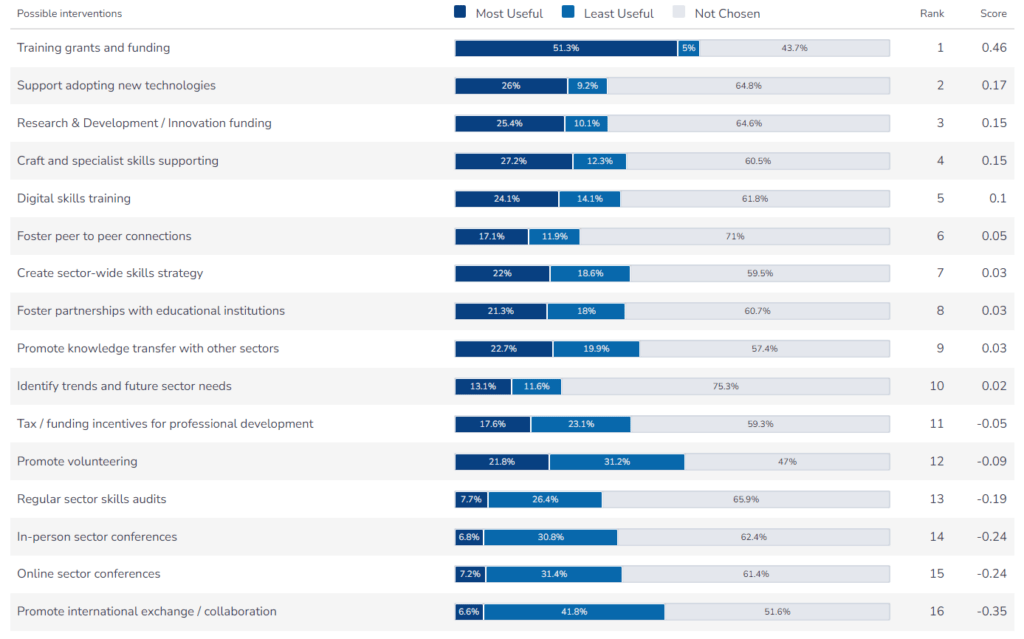Results from November 2023 Panel Research
In November 2023, 274 UK Heritage Pulse panel members responded to a survey which focused on skills in the heritage sector. Respondents were asked about their own skills and levels of confidence in their roles, where they felt there were skills gaps or shortages in their organisations and across the sector, and to what extent heritage organisations are investing in skills.
Sole traders were able to skip sections relating to organisational support of skills development.
3 in 4 respondents feel they have the skills needed to perform well in their role
72% of respondents feel they have the skills needed to perform well in their role in the heritage sector; however, 28% said this is ‘not always’ the case.
Thinking about your main work or volunteering role in the heritage sector, do you feel you currently have the skills needed to perform well?
Total respondents: 251

Only a minority of respondents (16%) said they feel overqualified for their current role. Those who have worked in the heritage sector for more than 10 years are less likely to feel overqualified (13%) compared to those who have worked in the sector for less than 10 years (26%).
Do you feel overqualified for your current role?
Total respondents: 181

When asked about specific areas where they feel additional training or development would be beneficial, the most common areas were digital and new technologies (including AI), business management, and marketing (including social media):
“I should probably do more on my IT skills which although reasonable are not all embracing. I have done some with Heritage Trust Network Digital Hero. However, time availability is a factor.”
“I would like training to be able to progress further in my role such as management skills and project management.”
“Project management – lack of that in my organisation but I am not confident in my own skills to bring in approaches etc. Digital skills always, especially creative use of technologies and being able to see how new technologies can be applied to your work.”
“IT systems. There’s so many different ways of storing files and information, and not enough training or time to do training, that I find it really difficult to even find files. Information systems should make working more efficient, but it’s got so complex that it’s making it more challenging.”
“Getting more out of social media channels – especially organic (not paying for social media advertising). Using AI to speed up Communications/PR tasks. Using Canva – I’ve never had any training on this.”
A majority feel that their organisation supports skills development and report slight increases in time and money spent in this area
70% of respondents said their organisation actively supports the development of their skills, with a third of respondents saying their organisation is ‘very supportive’. 7% expressed that their organisation does not support them in this development. Of the respondents who said their organisation was unsupportive (n.15 – a small sample), more than three-quarters worked in building-based organisations such as collections, museums, libraries, archives, historic buildings and monuments.
Of those who reported that their organisation was ‘very supportive’ of skills development (n.78), almost three-quarters worked in organisations with a turnover below £1m, and a little over three quarters had worked in the sector for more than a decade.
How supportive is your organisation in developing your skills?
Total respondents: 228

Respondents were asked whether they think there has been a change in the amount of time and money spent on developing skills in their organisation. 52% reported no change, 34% said it had increased and 10% that it had reduced.
53% of respondents said that the amount of money committed to skills development has also remained unchanged (a real terms cut when factoring in inflation), 28% that it has increased and 13% that it has reduced.
Larger organisations (annual turnover of more than £1 million) have greater capabilities to support skills development. 82% of respondents who work in larger organisations said their organisation was supportive in developing their skills compared to 68% in smaller organisations (annual turnover of less than £1 million).
Smaller organisations are more likely to have reduced the time they commit to skills development, but large organisations are just as likely to have reduced the money they commit to it.
Some skills shortages identified in digital, marketing and fundraising, as well as leadership and specialist heritage skills
Respondents were asked to identify areas within their organisations where they are experiencing either:
- a skills shortage where organisations find it challenging to recruit people with the skills required
- a skills gap where those working in organisations don’t currently have skills needed
From a list of options, digital, IT and data (including analysis) was identified most frequently, with 35% of respondents saying there was a skills shortage and 29% a skills gap. For those working in smaller organisations, this is a particular issue. 31% reported a skills gap compared to 19% of those working in larger organisations.
29% of respondents said there was a skills shortage in marketing and fundraising, with 23% reporting a skills gap. Again, both of these were selected by a higher proportion of those working in smaller organisations than larger organisations. 24% highlighted a skills shortage in project management, a particular issue for those working in larger organisations (33%).
28% of respondents felt there was a skills shortage in leadership and management skills, increasing to 32% for those who had worked in the sector for 10+ years. Those who had worked in the sector for a shorter length of time and those who were not a decision maker in their organisation were more likely to say there was a skills gap in their organisation in this area (28%). Those working in larger organisations were also more likely to report a skills gap in this area (27%).
A shortage in skills in specialist heritage areas including technical, craft and conservation was identified by 27% of respondents. Those who had worked in the sector for a longer period and those working in larger organisations were even more aware of this issue.
Other areas where respondents felt there were skills gaps across the sector include commercial knowledge, climate adaptation, building conservation and maintenance, and the management and administration of volunteer recruitment:
“Skills to support net zero e.g. climate mitigation and adaption”
“Commercial knowledge and entrepreneurship”
“Managing and working with volunteers… helping groups with Business Planning… skills gaps.”
“Commercial skills in income generation apart of fundraising or retail.”
“Traditional skills for building maintenance”
“Shortage of skilled operatives and contractors who can carry out conservation work. Shortage of professional skills – especially conservation accredited structural engineers (in Scotland).”
“Development economics. Place-making and design. Climate change – narrow focus on buildings and retrofitting – there is a much wider scope. Also, we have concerns over knowledge of legislation and policy (legal compliance).”
“Massive shortage of skilled tradesmen, especially lime plasterers and general builders with sufficient heritage knowledge and experience”
“Conservation, very few individuals and specialists and some key people we work with will be retiring soon.”
Respondents feel that skills related to climate adaptation and digital are likely to become more important in next 5-10 years
Looking to the future, when asked how they feel the skills needs of their roles might change in the next 5-10 years, answers included community building, more and new digital skills, and sustainability:
“Digital, personal/empathic/community building, income generating/marketing, training others.”
“Digital skills and carbon literacy skills will become more important.”
“I think digital and AI skills are going to develop and also knowledge relating to climate change and sustainability are going to become ever more important.”
“People, networking, management skills unchanged Digital skills needed will change as technology evolves & wider uptake (currently in small village, mainly elderly people, poor mobile signal & no phoneline/broadband to our heritage site, an old church).”
“More skills will be needed to survey historic buildings for climate adaptations.”
“Skills development: Biodiversity. Changing nature of town centre economics. AI and the implications for work, land-use, etc.”
Respondents felt that there were a number of emerging trends or new practices which their organisations did not have the skills to handle. These included the sector’s increased need to produce digital content, implementation of AI and external environmental factors:
“Changing environmental law, especially around biodiversity. We are awaiting the NPPF changes, which will have implications for things like housing need.”
“Managing larger/3D digitised and digital content. Digital preservation and born-digital curation.”
“Having recently embarked on a “survival” journey, new practices have had to be explored and implemented. External guidance has proven invaluable.”
“Visitor numbers not back to pre-COVID levels plus uncertainty over whether the village will be disrupted by major traffic problems lasting over a year causing a major drop in income when funding is needed to conduct urgent and expensive repairs.”
“We are often offered skills/training support from funders etc. so it’s not that we aren’t equipped to handle new trends, it’s more the time needed to investigate areas that may or may not be useful for us. The obvious new area is AI which could have big implications.”
“Move to net zero – and carbon accounting.”
“1: Application / impact of AI on heritage programme 2: Reduction of environmental impact 3: Achieving greater EDI”
After removing basic syntax, the most commonly mentioned words in free text responses were AI (n.170), Management (n.150), People (n.96), Change (n.92), Climate (n.89), Social (n.82), Fundraising (n.82), Planning (n.81) and Marketing (n.80).
Training grants and funding selected as the most effective intervention to support skills development
Finally, respondents were asked to consider possible interventions by governments, funders, and other sector-wide bodies to support skills development in the sector. We asked them to select which interventions they felt would be the most and least useful for the sector as a whole.
Training grants and funding ranked highest of the possible intervention, followed by support adopting new technologies and research and development or innovation funding. Craft and specialist skills support and digital skills training were also high.
Possible interventions which were ranked as the least useful were the promotion of international exchange or collaboration, as well as conferences, regular audits of skills and the promotion of volunteering.
A higher proportion of those who had worked in the sector for less than 10 years selected ‘promote volunteering’ as one of the most useful areas for their governing bodies to support.
Please tell us which you think would be the most useful and least useful for the sector as a whole.

What is your reaction to these results? Please let us know at hello@insights-alliance.com, or share on social media with the hashtag #UKHeritagePulse

